Reflections on an International Virtual Workshop
Abstract
The Canadian Hydrographic Service (CHS) expects the skillsets of its multidisciplinary hydrographers to evolve as the field of hydrography undergoes a digital transformation. To characterize these changes, the CHS organized a virtual workshop titled Hydrographer of the Future, in which it heard the perspectives of international colleagues in other Hydrographic offices (HO’s), industry, and academia. Despite some variations, common themes emerged: the changing technological context, people and culture, and the future role of hydrography. The results of this workshop support the CHS’ own internal planning; however, the CHS also hopes to continue learning from its international partners and share its experiences through the International Hydrographic Organization’s (IHO) e-learning center.
1. Introduction
The CHS multidisciplinary hydrographers are thoroughly trained and responsible for all aspects of data acquisition, data transformation, tides, currents and water levels, and cartography; however, as the hydrographic organization transitions to data-driven products and services, the type of work performed by its hydrographers is likely to change as well. In anticipation, the CHS is trying to envisage the skillset that its staff will require in a totally digital work environment.
Understanding that many hydrographic offices (HO’s) and organizations within the hydrographic community are undergoing similar shifts to a digital workplace, the CHS convened an international advisory group who helped the CHS to develop discussion topics for a workshop on the Hydrographer of the Future held April 21, 2022.
The CHS’ principal aim for the workshop was to hear our international colleagues’ thoughts on the skillsets and training required for hydrographers in a more digital work environment to help define the CHS Hydrographer of the Future. In so doing, the CHS hopes to ensure a successful and enduring digital transformation at CHS. Many of the themes (e.g. Technology; People, Skills, and Organizational Culture) that emerged from the workshop, however, would benefit hydrographic organizations, private enterprises, and academic institutions around the world. The CHS was honoured to have provoked and participated in this international conversation and is grateful to all those who participated in the conversation.
The CHS received overwhelmingly positive feedback after the workshop; participants were engaged and interested in actively participating and contributing to small group discussions by sharing their knowledge, experience and ideas. Many participants expressed an interest in continuing the conversation, and so the CHS is sharing its experiences through a workshop report and by way of the publication of this note. The results of the workshop will also act as input to internal CHS planning and a new human resources and training plan.
2. Workshop Overview
The Workshop was a four-hour virtual event in which, after opening remarks and a short keynote address, participants were divided into seven small discussion groups of one Chair, one Rapporteur and between 10 to 15 contributors, each with a topic to help guide the discussion:
- How will technology enable hydrographers to solve a problem in the future? (two groups discussed this topic)
- What is in the toolbox of the hydrographer of the future?
- Do you think that digital transformation will increase the need for specialization or generalization?
- How do you see the composition of your workforce changing into the future?
- What are the evolving hydrographer’s skills to work effectively in the Blue Economy?
- How will future larger hydrographic datasets impact changes in data management?
In total, 98 forward thinking individuals who had a keen interest in being part of the changes in the field of hydrography participated in the workshop (Figure 1, see next page). Participants were members of HO’s, academia, and industry (Figure 2) and represented 24 different countries: Australia, Brazil, Canada, Cyprus, Denmark, Finland, France, Germany, Greece, Japan, Kenya, Republic of Korea, Monaco, Norway, New Zealand, Oman, Portugal, Singapore, South Africa, Spain, Sweden, Thailand, the United Kingdom and the United States of America.
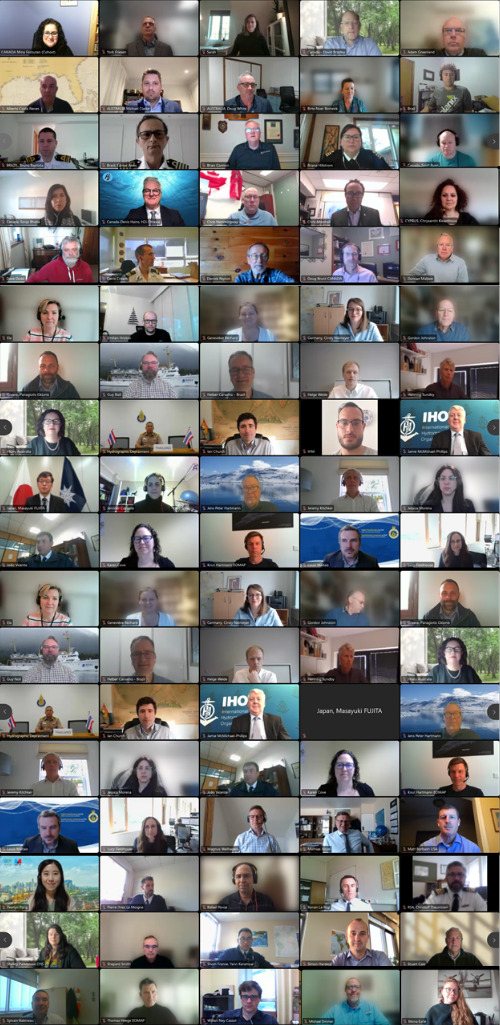
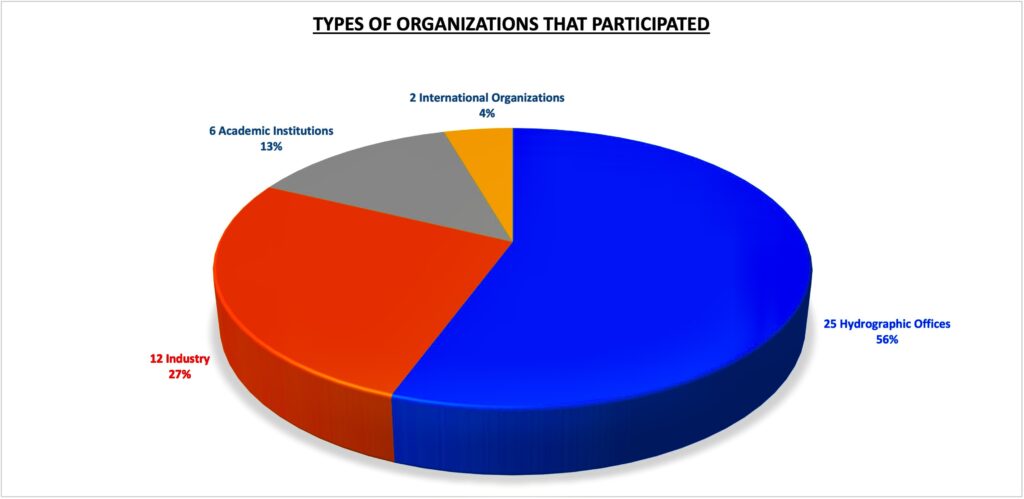
3. Common Themes
Through the many conversations, there was considerable variability in how participants viewed the Hydrographer of the Future. This variation contributed to the richness of the discussion and allowed CHS to think more deeply about its own approach to workforce and workplace. Still many common themes emerged that will help guide future conversations and allow CHS to scope out its own internal discussions (Table 1). While the focus was primarily on the hydrographer’s skillset, some weight was also given to technical needs and the context in which hydrographers are operating. These themes are discussed below.
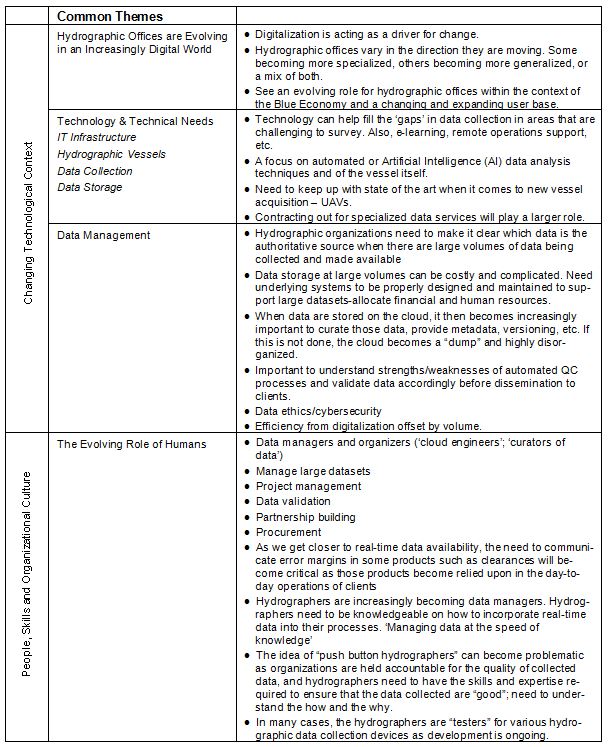
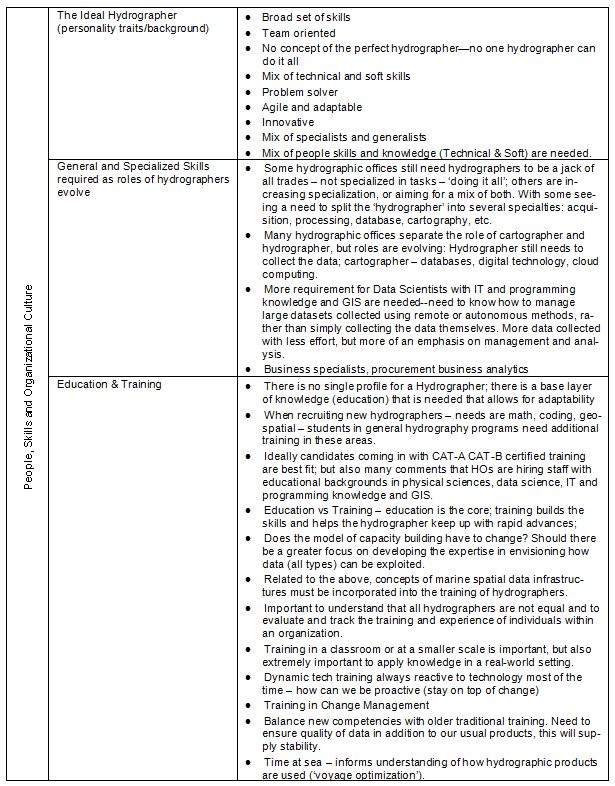
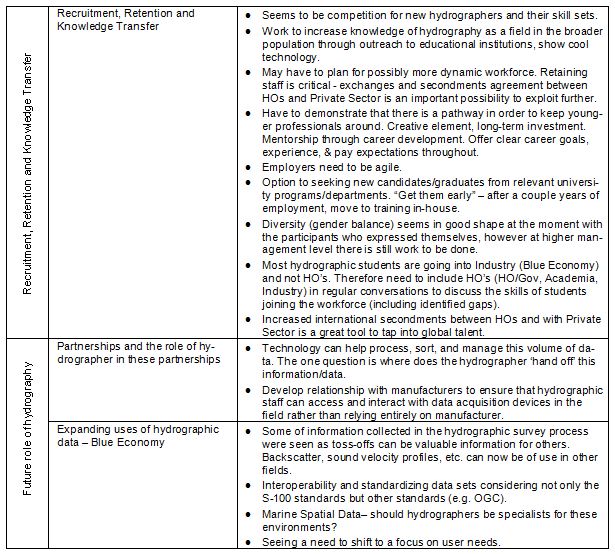
3.1 Changing Technological Context
3.1.1 The Evolving Role of the Hydrographic Office
Participants were unanimous in identifying digitalization as the primary driver for change within their respective organizations and many saw an evolving role for their workplaces as the uses and applications for hydrographic data expanded in the context of the Blue Economy (Table 1). Despite this commonality, participants’ organizations differed in their response to this driver, with their chosen direction determined in part by their national, regional and demographic contexts, as well as their organizational structure.
3.1.2 Technology and Technical Needs
Participants seemed largely to view the role of technology favourably, identifying the possibility that technological advances could fill gaps in data collection, particularly in previously hard-to-reach places or as a force multiplier to increase coverage. The use of uncrewed surface or autonomous vessels came up in many contexts as well as the use of artificial intelligence to support or perform data analysis. Bringing this discussion back to the hydrographer’s skillset, some identified the need to contract out for some of these specialized services on an as-needed basis.
3.1.3 Data Management
While technological advances have improved the efficiency of data collection, one large challenge is then dealing with the large volume of data that emerges post-survey. There were many concerns expressed about quality assurance and control of the data, as well as how to store and categorize these data. Defining the authoritative source, as well as thorough metadata and versioning control were identified as important to making fulsome use of the data collected. Storing large volumes of data can be costly and complicated. Organizations will need an underlying system that is properly designed and can handle large datasets. Hydrographic organizations will need to strike a balance between the efficiency gains in data collection and the subsequent burden on the data analysis side.
3.2 People, Skills, and Organizational Culture
3.2.1 The Evolving Role of Humans
In many organizations, the traditional role for staff has been as hydrographer (data collector) or cartographer (chart maker). At CHS, multidisciplinary hydrographers fulfill both roles. Participants were consistent in their view that traditional knowledge, like knowing what makes a good chart, or being able to assess the quality of data collected, will remain important because hydrographers will still need to oversee all aspects of hydrography from data collection to dissemination; however, participants also noted that there will be no single profile of hydrographer in the future. Increasingly HO’s will also need hydrographers to be data and project managers. Hydrographers or others within the HO will also need skills in data validation, partnership building and procurement as uses for hydrographic data expand and specialized services are leveraged on an as-needed basis.
3.2.2 The Ideal Hydrographer of the Future – Core Competencies
Recognizing the dynamic environment in which the hydrographic community finds itself, participants predicted that they will need hydrographers with a broad set of skills, though no one hydrographer will need to embody all of the necessary skills the workplace will require. Therefore a team-based approach will be needed to meet the challenges of the future. With that in mind, participants identified the need for individuals who are team oriented, agile and adaptable,
problem solvers, innovative, and have a mix of technical and soft skills.
3.2.3 The Hydrographer of the Future – A Generalist or Specialist?
Participants diverged markedly in their approach to recruiting generalists and specialists and even in their definitions of generalists and specialists. Some viewed hydrographers as generalists who then go on to specialize in a sub-hydrographic specialty, like data acquisition, or processing and others viewing hydrographers themselves as specialists. In addition, though CHS does not distinguish between hydrographers and cartographers, many HO’s around the world do, and this is reflected in the separation of the certification at the IHO-level, as CAT A or CAT B. Participants’ workplaces also differed in their aims of recruiting generalists and specialists, with some looking to recruit only specialists, particularly in IT, data management, and business. Others were looking only for generalists, and others were looking for a mix of both.
3.2.4 Education and Training
Participants identified that the Hydrographer of the Future will need an educational background that provides a base layer of knowledge and then ongoing training to support to help them to adapt to a fast-paced and dynamic work environment, including courses in change management. Participant overall felt that this base level of educations should include courses in mathematics, coding, and geospatial techniques; however, there were differences in whether this base level requirement meant hydrographers or cartographers should have Cat-A or B certification or more unconventional training. Questions arose as to whether the model for capacity building will need to change to be more data-focused, and for the hydrographer to understand uses for hydrographic data beyond navigation. Participants acknowledged the importance of being proactive, to stay on top of change. From several angles, participants narrowed in on the importance of hands-on training to complement the theoretical understanding hydrographers may develop in more traditional course-based programs; e.g. spending time at sea to understand how navigational products are used.
3.2.5 Recruitment, Retention, and Knowledge Transfer
Competition for new hydrographers and IT specialists was a common theme, with participants finding it difficult both to recruit and retain hydrographers. With increasing retirements in some HO’s as well as higher staff turnover in general, concerns arose about knowledge retention and transfer. These challenges appear to directly influence the educational requirements set by different workplaces as well as the approaches of these workplaces to ongoing training. With many organizations broadening their educational requirements to meet their staffing needs and others developing training programs tied to promotional opportunities to attract and retain talent. Participants identified the importance of promoting the field of hydrography at educational institutions to attract more talent to the field. Many HO’s indicated that talent is preferring the private sector over government agencies and identified the value of secondments or partnerships with the private sector and academia to improve retention. On the issue of diversity, participants noted that gender balance appeared to be improving at the entry level, but there was still work to be done at the managerial/leadership level.
3.3 The Future Role of Hydrography
Participants noted the expanding uses of hydrographic data in the context of the Blue Economy, and the importance of Marine Spatial Data. They noted that HO’s now need to focus more on user needs beyond navigation. Participants observed, however, that the importance of standardizing datasets remained both in the hydrographic context under S-100 and for other applications as well, like the Open Geospatial Consortium. As the role of HO’s and hydrographic data evolves, participants emphasized the importance of partnerships and defining where the hydrographer fits into the value chain; at what point does the hydrographer handoff the data to a partner? These are all questions that will require engagement and collaboration both internally and between HO’s and stakeholders.
4 Conclusion and Next Steps
The international discussion fostered by the Hydrographer of the Future Workshop is a first step in helping to define the skillset of the CHS Hydrographer of the Future and will help the CHS to be more innovative in the way that the organization recruits and builds capacity today. Investment in the CHS’ future workforce begins now because the people the CHS hire today will be the organization’s Hydrographers of the Future. Furthermore, the digital transformation has already begun and so CHS needs to prepare staff to change and evolve as the hydrographic landscape changes. The details of what we heard can be found in the Final Report of the virtual workshop.
As many HO’s around the world undergo similar reflections about their own workforces, we at the CHS hope that sharing the results of the workshop will be of benefit to our partners. We hope to build on the energy expressed and momentum gained from the workshop to continue to collaborate and ponder about how we navigate this transformative time. The conversations spurred by the workshop could also be a starting point for joint learning through the International Hydrographic Organization’s e-learning project.
4. Conclusion and Next Steps
The international discussion fostered by the Hydrographer of the Future Workshop is a first step in helping to define the skillset of the CHS Hydrographer of the Future and will help the CHS to be more innovative in the way that the organization recruits and builds capacity today. Investment in the CHS’ future workforce begins now because the people the CHS hire today will be the organization’s Hydrographers of the Future. Furthermore, the digital transformation has already begun and so CHS needs to prepare staff to change and evolve as the hydrographic landscape changes. The details of what we heard can be found in the Final Report of the virtual workshop.
As many HO’s around the world undergo similar reflections about their own workforces, we at the CHS hope that sharing the results of the workshop will be of benefit to our partners. We hope to build on the energy expressed and momentum gained from the workshop to continue to collaborate and ponder about how we navigate this transformative time. The conversations spurred by the workshop could also be a starting point for joint learning through the International Hydrographic Organization’s e-learning project.
5. References
Foroutan, M., Bhatia, S., Béchard, G. (2022). CHS Hydrographer of the Future Workshop Report, April 2022.
